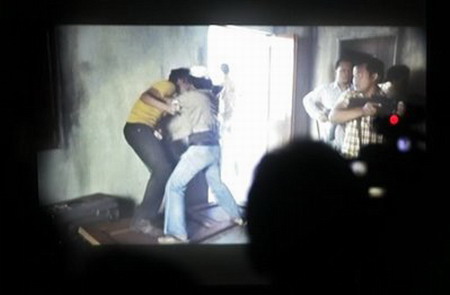Asia-Pacific
Indonesian army killed reporters: ex-officer
(Agencies)
Updated: 2009-12-08 15:08
|
 People watch the film Balibo which depicts the murders of Australian-based journalists during Indonesia's 1975 invasion of East Timor, Thursday, December 3, 2009, at a gallery in Jakarta. [Agencies] |
JAKARTA, Indonesia: A former Indonesian army colonel has told a magazine that soldiers deliberately killed five Western journalists in East Timor in 1975, contradicting his government's line that they accidentally died in a crossfire.
The explosive claim in the weekly Tempo magazine, published on Monday, further fuels diplomatic tensions between Indonesia and Australia created in September when Australian federal police launched a war crimes investigation into the journalists' deaths in the East Timorese border town of Balibo in the weeks before Indonesia invaded the former Portuguese colony.
It comes amid renewed public interest in the case spurred by the release this year of an Australian movie about the incident named "Balibo." Indonesian authorities have banned the Robert Connolly-directed movie's release in that country.
Gatot Purwanto told Tempo he was a lieutenant in the special forces team that overran Balibo on October 16, 1975. The journalists, who have become known as the Balibo Five, were shot to keep secret Indonesia's military involvement two months before a full-blown invasion, he said.
Asked if the soldiers decided to kill the reporters -- two Australians, two Britons and a New Zealander -- Purwanto said "yes."
"If they had been left alive, they would say it was an Indonesian invasion," Purwanto said.
Purwanto, who now runs a security firm, said the bodies were burned to hide the evidence.
Yunus Yosfiah, who was then an army captain and later a government minister, had been waiting for instructions from Jakarta on what to do with the reporters but they were killed before Jakarta gave orders, Purwanto said.
In 2007, an Australian coroner found that the journalists were killed on Yosfiah's orders. He has denied it.
Shirley Shackleton, the widow of Greg Shackleton, who was among the Australians killed, welcomed Purwanto's move in becoming the first senior Indonesian soldier to contradict the official story that the journalists were killed in crossfire.
"It is a milestone. It's another nail in the coffin of lies," she told Australia's Fairfax Radio Network on Tuesday.
Yosfiah could not be contacted for comment.
Purwanto later told Indonesian reporters after a private screening of the movie late Monday that he stood by what he had told Tempo. He added that the movie was sensationalized and that only half the events in Balibo as depicted in the movie were accurate.
Indonesian military spokesman Rear Marshal Sagom Tamboen said the East Timor conflict was part of history and both Indonesia and East Timor were committed to living in harmony in the future.
"Everyone may have a different perception of what Purwanto said ... but we are sure it will not affect the good ties between Indonesia, East Timor and Australia," Tamboen said.
The "Balibo" movie depicts Indonesian soldiers shooting and stabbing the unarmed journalists. Indonesia's censorship board said the script was based on testimony of witnesses of "questionable nature."






